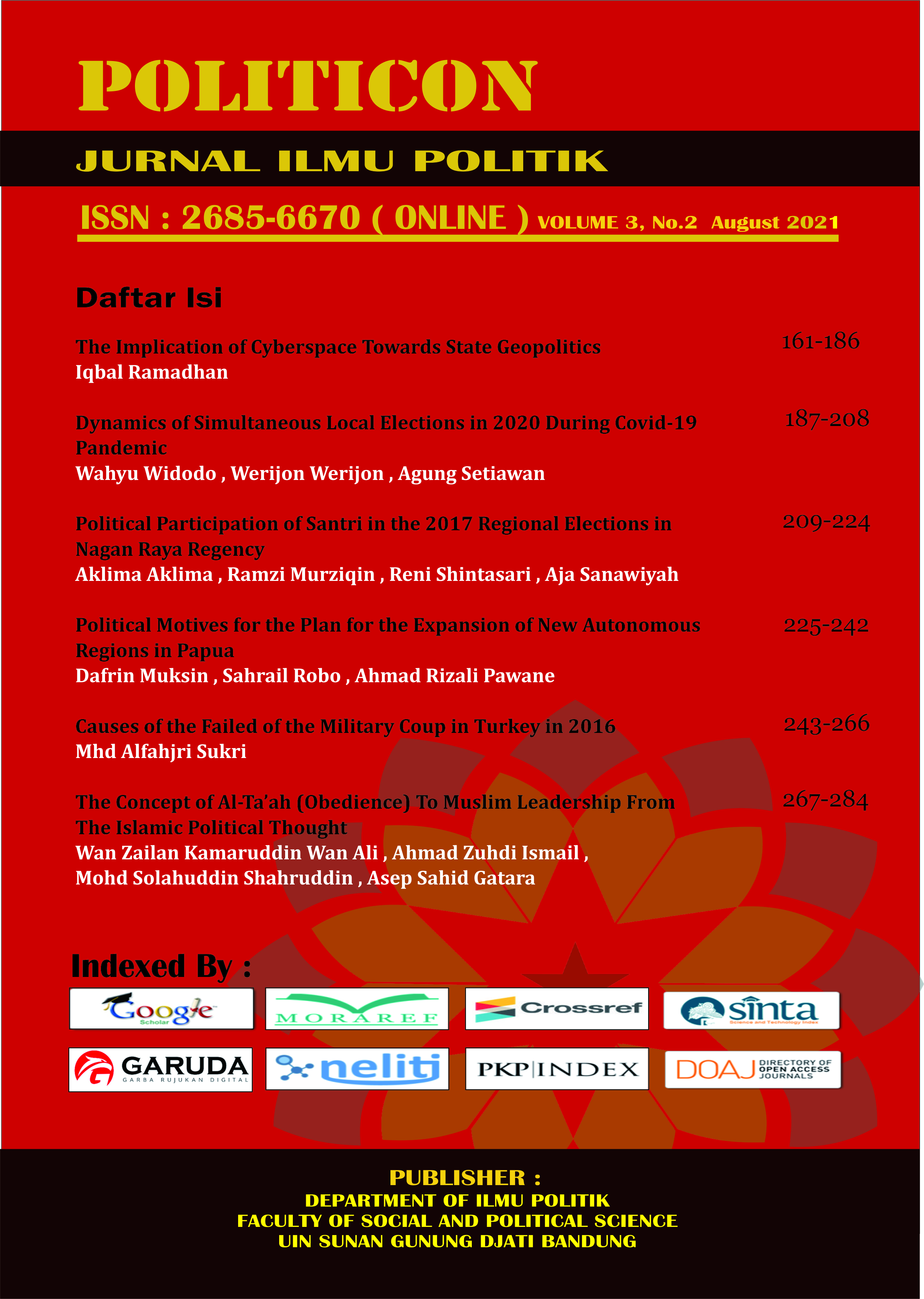Political Participation of Santri in the 2017 Regional Elections in Nagan Raya Regency
DOI:
https://doi.org/10.15575/politicon.v3i2.12219Keywords:
Political Participation, Santri, Regional ElectionsAbstract
This research deals with the participation of students in Islamic boarding schools (dayah), which tend to deepen religion so that political information is limited. This study aims to determine the political participation of students in Nagan Raya Aceh 2017. This research is important because it looks at the attitude of students in political power relations. The urgency of this research is to understand the political culture of the santri, which is not only seen from the Kyai as a determinant of political choices. This research uses a qualitative method of the case study approach. The results of this study indicate that the behavior of voters (santri) with the Michigan School approach where the political attitudes and choices are chosen is not only based on the leadership of the pesantren / santri but there is direct involvement by the participation of the students with three aspects.
References
Affan Gaffar. (1992). Javanese Voters: A Case Study Of Election Under A Hegemonic Party System. Yogyakarta: Gajah Mada University Press.
Aklima, A., & Ramadhan, I. (2019). Politik Dinasti di Aceh; Studi Kepemimpinan Ampon Bang di Kabupaten Nagan Raya. Al-Ijtima`i: International Journal of Government and Social Science. https://doi.org/10.22373/jai.v5i1.467
Almuhajir. (2015). Politik Penyertaan Dayah di Aceh. Jurnal Ilmiah ISLAM FUTURA, 14(2), 232–249.
Arina Rohmatul Hidayah. (2021). Marketing Politik Aliran oleh Kandidat melalui Facebook dalam Pemilihan Kepala Daerah Jawa Timur Tahun 2018. POLITICON, 3(1), 1–33.
Dalton, R. J. (2002). Citizens Politic: Public Opinion and Political Parties in Advanced Industrial Democracies. New York: Chatham House Publishers.
Endra, W. S. (1979). Kamus Politik serta penjelasannya. Surabaya: Study Group.
Haryanto, H. (2016). Kebangkitan Party ID: Analisis Perilaku Memilih dalam Politik Lokal di Indonesia. Jurnal Ilmu Sosial Dan Ilmu Politik. https://doi.org/10.22146/jsp.13082
Hasbullah. (1999). Sejarah Pendidikan Islam di Indonesia: Lintasan Sejarah Pertumbuhan dan Perkembangan. Jakarta: Raja Grafindo.
Hidayat, M. (2016). Model Komunikasi Kyai dengan Santri di Pesantren. Jurnal Komunikasi ASPIKOM, 2(6), 385–395.
Leo Agustino. (2009). Pilkada dan Dinamika Politik Lokal. Yogyakarta: Pustaka Pelajar.
Mashuri. (2013). Dinamika Sistem Pendidikan Islam Di Dayah. Jurnal Ilmiah Didaktika, 8(2).
Miles, B. M. dan M. H. (1992). Analisis Data Kualitatif Buku Sumber Tentang Metode-metode Baru. Jakarta: UIP.
Mochtar Mas’ud & Abdurrahman. (2004). Intelektual Pesantren Perhelatan Agama dan Tradisi. Yogyakarta: LKiS.
Ramadhan, G. (2020). Pilkada Bekasi Dalam Dilema Patron Klien: Antara Sosiologi Politik Dan Pemilih Rasional. Journal of Social Politics and Governance (JSPG).
https://doi.org/10.24076/jspg.2020v2i1.176
Ronnie Farzianto & Al Rafni. (2020). Orientasi Politik Santri Pada Pemilihan Umum Tahun 2019 (Studi di Pondok Pesantren Darul Ulum Kelurahan Aia Pacah Kota Padang). Journal of Civic Education, 3(1), 101.
Scott, J. C. (1993). Perlawanan Kaum Tani. Jakarta: Yayasan Obor Indonesia.
Setiawan, E. (2012). Eksistensi Budaya Patron Klien dalam Pesantren : Studi Hubungan Kiai dan Santri. Jurnal Studi Islam Ulul Albab, 13(2).
Sudarman & Reza Febriandi. (2018). Partisipasi Politik Santri pada Pemilihan Bupati Aceh Barat 2017. Jurnal Public Policy, 3(2), 237–247. https://doi.org/https://doi.org/10.35308/jpp.v3i2.72
Sudarman Alwy dan Misnawati. (2018). Kemenangan Jadin dan Interaksi Sosial pada Pemilukada 2017 Kabupaten Nagan Raya. Community, 4(2).
Sugiyono. (2009). Metode Penelitian Kuantitatif, Kualitatif dan R&D. Bandung: Alfabeta.
Yeshinta Veradella Anugrah & Agus Machfud Fauzi. (2019). Hegemoni Kyai terhadap Santri. Paradigma, 7(4), 1–6.
Zainuddin Syarif. (2016). Pergeseran Perilaku Politik Kiai dan Santri di Pamekasan Madura. Al-Tahrir, 16(2), 293–311.
Downloads
Published
How to Cite
Issue
Section
License
Authors who publish with this journal agree to the following terms:
- Authors retain copyright and grant the journal right of first publication with the work simultaneously licensed under a Creative Commons Attribution-ShareAlike 4.0 International License that allows others to share the work with an acknowledgment of the work's authorship and initial publication in this journal.
- Authors are able to enter into separate, additional contractual arrangements for the non-exclusive distribution of the journal's published version of the work (e.g., post it to an institutional repository or publish it in a book), with an acknowledgment of its initial publication in this journal.
- Authors are permitted and encouraged to post their work online (e.g., in institutional repositories or on their website) prior to and during the submission process, as it can lead to productive exchanges, as well as earlier and greater citation of published work (See The Effect of Open Access).





.jpg)



